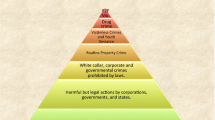Abstract
The purpose of this paper is to direct attention to a challenge—referred to as the threshold challenge—facing a non-absolutist retributivist view on international criminal justice. It is argued, on the one hand, that this challenge constitutes a practically pertinent problem for the retributivist approach to the punishment of mass crimes and, on the other, that it is very hard to imagine any principled way of meeting this challenge.
Similar content being viewed by others
Notes
The Rome Statute, Article 5. The subject-matter jurisdiction of the ICC is limited to war crimes, crimes against humanity, genocide, and—though not in practice—aggression.
See, for instance, Ryberg (2004), Introduction.
For instance, an amnesty proposal was offered in Kenya to persuade the leader Daniel Arap Moi to step down in favour of elections, see May (2002, p. 245).
In the following, I draw on Malamud-Goti (1990).
See Fichtelberg (2005).
‘Let the world perish so long as justice be done’.
References
Beigbeder, Yves. 1999. Judging war criminals. Great Britain: Macmillan Press.
Ellis, Anthony. 2001. What should we do with war criminals? In War crimes and collective wrondoing, ed. Aleksander Jokic. Oxford: Blackwell.
Fichtelberg, Aaron. 2005. Crimes beyond Justice? Retributivism and war crimes. Criminal Justice Ethics 21: 31–46.
Fried, Charles. 1978. Right and wrong. Cambridge: Harvard University Press.
Kagan, Shelly. 1998. Normative ethics. Boulder: Westview Press.
Malamud-Goti, Jaime. 1990. Transitional government in the breach: Why punish state criminals? Human Rights Quarterly 12: 1–16.
May, Larry. 2005. Crimes against humanity. A normative account. Cambridge: Cambridge University Press.
McCloskey, H. J. 1962. The complexity of the concept of punishment. Philosophy 37: 307–325.
McCloskey, H. J. 1972. A non-utilitarian approach to punishment. In Philosophical perspectives on punishment, ed. Gertrude Ezorsky. Albany: State University of New York Press.
Méndez, Juan E. 2000. National reconciliation, transitional justice, and the international criminal court. Ethics and International Affairs 15: 25–44.
Primiratz, Igor. 1998. Justifying legal punishment. London: Humanities Press Int.
Ross, William David. 1967. The right and the good. Oxford: Oxford University Press.
Ryberg, Jesper. 2004. The ethics of proportionate punishment. A critical investigation. Dordrecht: Kluwer.
Ryberg, Jesper. 2005. Mercy and justice in criminal law. SATS–Nordic Journal of Philosophy 6: 75.
Tallgren, Immi. 2002. The sensibility and sense of international criminal law. European Journal of International Law 13: 561–595.
Wilkins, Buerleigh T. 2001. Whose trial? Whose reconciliation? In War crimes and collective wrondoing, ed. Aleksander Jokic. Oxford: Blackwell.
Author information
Authors and Affiliations
Corresponding author
Rights and permissions
About this article
Cite this article
Ryberg, J. Mass Atrocities, Retributivism, and the Threshold Challenge. Res Publica 16, 169–179 (2010). https://doi.org/10.1007/s11158-010-9113-3
Published:
Issue Date:
DOI: https://doi.org/10.1007/s11158-010-9113-3




